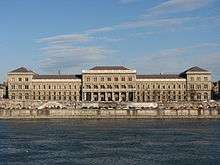Czech Technical University in Prague
Czech Technical University in Prague (CTU, Czech: České vysoké učení technické v Praze, ČVUT) is one of the largest universities in the Czech Republic, and is one of the oldest institutes of technology in Central Europe. It is also the oldest non-military technical university in Europe.[1]
České vysoké učení technické v Praze | |
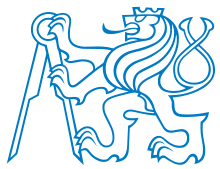 | |
| Motto | Scientia est potentia (Latin) |
|---|---|
Motto in English | Knowledge is power |
| Type | Public |
| Established | 1707 by the Kingdom of Bohemia |
| Affiliation | PEGASUS CESAER |
| Rector | Vojtěch Petráček |
Administrative staff | 2,717 (2017) |
| Students | 18,875 (2017) |
| Location | , Czech Republic 50°6′7.8″N 14°23′18.5″E |
| Website | www |
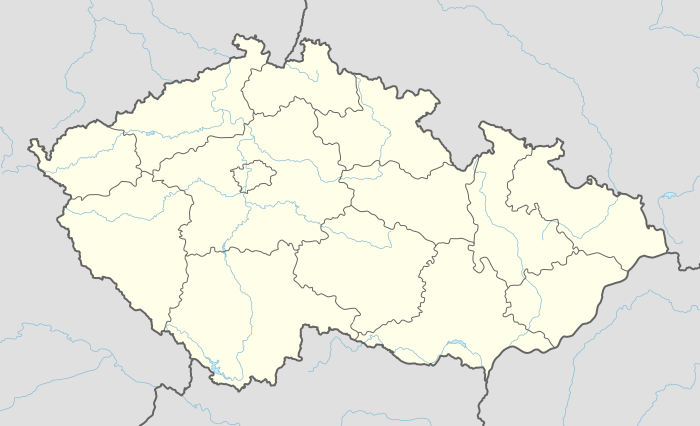
In the academic year 2017/18 Czech Technical University offered 128 degree programs in Czech and 87 in English.
History
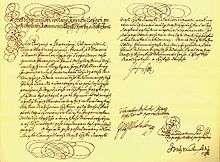
It was established as the Institute of Engineering Education in 1707, but as a secondary education (high school) instead of a tertiary university, by Emperor Joseph I[2] as a response to Christian Josef Willenberg's petition addressed to preceding emperor Leopold I. In 1806 the institute of Engineering Education was transformed into Prague Polytechnical Institute (or Prague Polytechnic), when the university studies began. After the disintegration of the Austro-Hungarian Empire, the name of the school was changed in 1920 to the Czech Technical University in Prague.
Origins
In 1705, Christian Josef Willenberg asked Emperor Leopold I for permission to teach "the art of engineering". Later, the emperor's only son, who succeeded him on the throne in 1707 as Joseph I, ordered the Czech state of Prague to provide engineering education. Due to various reasons the request was avoided long periods of time but in October 1716 Willenberg repeated the request and finally on 9 November 1717 a decree by the Czech state granted Willenberg the professorship (first engineering professorship in Central Europe) and on 7 January 1718 he began teaching. Initially, Willenberg started teaching only 12 students in his own apartment (six barons , four knights and two burghers), but gradually students proliferated (in 1779 there were around 200) and they started studying in more suitable premises. Initially, the training focused mainly on the military. Teaching in the first year lasted one hour per day in the second year almost two.
The successor of prof. Willenberg was Johann Ferdinand Schor, builder of hydraulic structures in the basin of the Vltava and author of textbooks used at the school of mathematics. He began under Willenberg's leadership by teaching optics, perspectivity, technical drawing and geography. The third was professor František Antonín Herget, who mainly focused on civil engineering, particularly construction.
In September 1776 Maria Theresa allowed Herget to use the Clementinum building; in 1786 the school moved to the new and better building.
In 1787 the School of Engineering was established at the decree of Emperor Joseph II.
Academic profile
| University rankings | |
|---|---|
| Global – Overall | |
| ARWU World[3] | 601-700 |
| CWTS World[4] | 799 |
| THE World[5] | 601-800 |
| USNWR Global[6] | 410 |
| QS World[7] | 531-540 |
| National – Overall | |
| ARWU National[3] | 3 |
| THE National[5] | 3 |
| QS National[7] | 2 |
Rankings
The CTU is the best technical university in the Czech Republic. In 2010, in the world rating of THES-QS universities in the category of technical sciences, the CTU took the 121st place, in the category of natural sciences – 246th place.[8] In 2018 Czech Technical University was ranked as 220th in Engineering and Technology in the QS World University Rankings.[9]
Admissions
Students apply to faculty. Each faculty has different admissions requirements. Acceptance rate ranges from 52.32% (Faculty of Information Technology) to 81.51% (Faculty of Transportation Sciences).[10] The percentage of international students grew from 2.5% in 2000 to 16.4% in 2017.[11][12]
Graduation rate
Due to the pace and difficulty of CTU coursework, high percentage of students fail to complete first year of their studies. First year failure rates range from 23% (Faculty of Civil Engineering) to 47% (Faculty of Information Technology).[13] Overall, only 48% of enrolled undergraduate students end up graduating.
International cooperation
Study and work abroad
CTU has international agreements with 484 foreign universities. Many of them are ranked in the first hundred in QS World University Rankings such as National University of Singapore, Nanyang Technological University, Purdue University, Korea Institute of Science and Technology (KAIST), Hong Kong University of Science and Technology, Technical University of Munich, Delft University of Technology or KU Leuven.
CTU has many bilateral agreements with universities outside of Europe. The most sought after universities are from Canada, Australia, Singapore, United States and Japan. That said, every year many students choose to study in attractive destinations such as Argentina, Brazil, China, Hong Kong, Indie, Indonesia, South Africa, South Korea, Costa Rica, Mexico, New Zealand, Peru, Russia or Taiwan.
CTU also participates in the European programmes Erasmus and Leonardo.[8]
International students
CTU has currently over 3500 international students from 117 countries. About 750 of them are an exchange students. One of the organizations that takes care of international students is International Student Club (ISC), which organizes Buddy Programme and extra-curricular activities.
Dual diploma
CTU has currently 21 agreements with universities such as Technical University of Munich, RWTH Aachen or Trinity College Dublin.
Constituent parts
| Faculty/school | Year founded |
| Civil Engineering | 1707 |
| Mechanical Engineering | 1864 |
| Electrical Engineering | 1950 |
| Nuclear Sciences and Physical Engineering | 1955 |
| Architecture | 1976 |
| MIAS School of Business | 1992 |
| Transportation Sciences | 1993 |
| Biomedical Engineering | 2005 |
| Information Technology | 2009 |
CTU has 8 faculties. The oldest one (Faculty of Civil Engineering) was founded in 1707, while the youngest and most selective faculty (Faculty of Information Technology) was founded in 2009.
The university also has 5 university institutes, such as Czech Institute of Informatics, Robotics and Cybernetics, Klokner Institute, Institute of Physical Education and Sport, University Centre for Energy Efficient Buildings and Institute of Experimental and Applied Physics.
Other constituent parts include Computing and Information Centre, Technology and Innovation Centre, The Research Centre for Industrial Heritage, Centre for Radiochemistry and Radiation Chemistry, Division of Construction and Investment and Central Library.
The university also has a Publishing House and service facilities.
Student clubs within the CTU are integrated in the Student Union. It has 27 members and covers a wide range of free time activities, with the biggest club being Silicon Hill. The Student Union also organizes social events for students throughout the year.
Notable alumni
- František Běhounek, radiologist
- Christian Doppler, mathematician and physicist
- Ivan Puluj, physicist and one of the founders of medical radiology
- Antonín Engel, architect
- Josef Gerstner, physicist and engineer
- Václav Havel, statesman, writer and former dissident, who served as the last President of Czechoslovakia
- Josef Hlávka, architect, main founder of Academy of Science, patron
- Eva Jiřičná, architect
- Karel Jonáš, who became Charles Jonas (Wisconsin politician), Czech-American publisher, legislator and Lieutenant Governor of Wisconsin
- George Klir, computer and systems scientist
- Karl Kořistka, geographer and technologist
- František Křižík, inventor, electrical engineer and entrepreneur
- Ivo Lukačovič, entrepreneur, founder and chairman of Seznam.cz
- Vladimir Prelog, chemist and Nobel Prize winner
- Richard Rychtarik, set designer
- Emil Votoček, chemist
- Emil Weyr, mathematician
- Josef Zítek, architect and engineer
Gallery
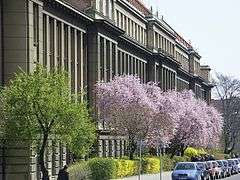 The CTU Rectorate
The CTU Rectorate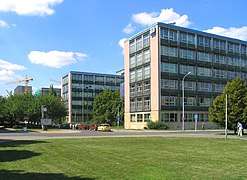 Dejvice campus
Dejvice campus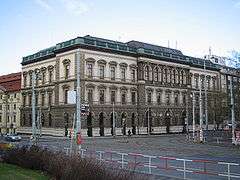 Karlovo Náměstí campus
Karlovo Náměstí campus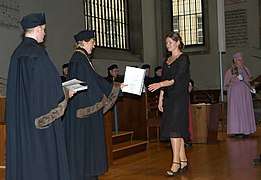 Bethlehem Chapel – The CTU's ceremonial hall
Bethlehem Chapel – The CTU's ceremonial hall Dejvice campus - Library, FA, FIT
Dejvice campus - Library, FA, FIT Interior of National Technical Library
Interior of National Technical Library
Notes and references
- Czech Technical University In Prague - Topuniversities
- "Rescript of the Emperor Joseph I". Archived from the original on 2009-10-05.
- "ARWU World University Rankings 2018 | Academic Ranking of World Universities 2018 | Top 500 universities | Shanghai Ranking - 2018". www.shanghairanking.com.
- Studies (CWTS), Centre for Science and Technology. "CWTS Leiden Ranking". CWTS Leiden Ranking.
- "World University Rankings". Times Higher Education (THE). August 18, 2017.
- "Ranking". www.usnews.com. Retrieved 2020-01-26.
- "QS World University Rankings 2019". Top Universities. February 1, 2017.
- "Czech Technical University (CTU)". msmstudy.eu. Archived from the original on August 29, 2018.
- "QS Engineering and Technology ranking". topuniversities.com.
- "Acceptance rate of Czech Universities". vysokeskoly.com (in Czech).
- "Annual report 2000" [Czech] (PDF). cvut.cz (in Czech). Archived from the original (PDF) on October 21, 2018.
- "Annual report 2017" (PDF). cvut.cz (in Czech). Archived from the original (PDF) on October 21, 2018.
- "Annual report 2017" (PDF). cvut.cz (in Czech). p. 77. Archived from the original (PDF) on October 21, 2018.
External links
| Wikimedia Commons has media related to Czech Technical University. |
- CTU official website in English
- CTU official website in Czech
- www.StudyAtCTU.com Official website for international students
- International Student Club Organization for international students
- IAESTE Organization for international students
- UCEEB University Centre for Energy Efficient Buildings (UCEEB)
- Top Industrial Managers for Europe (TIME) network for student mobility.
